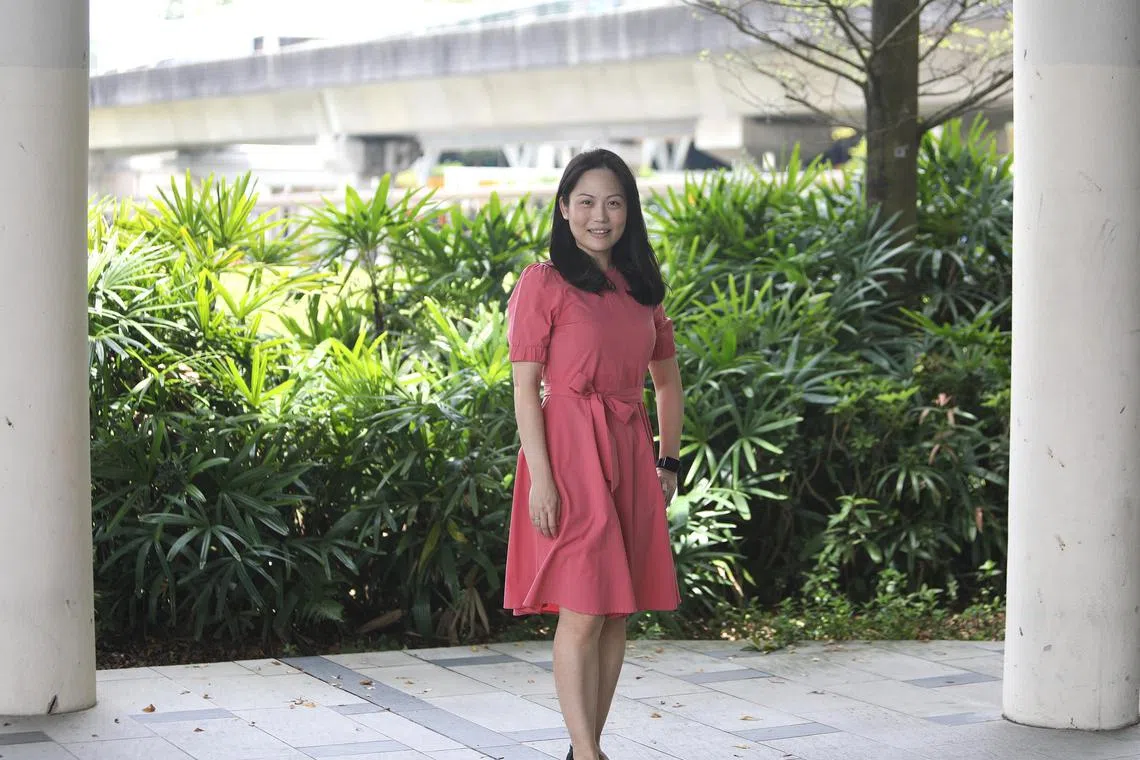New guide to help people cope with grief before loss of a loved one, not just after
Sign up now: Get ST's newsletters delivered to your inbox

The guidebook, launched at Allkin Singapore's World Mental Health Day event, seeks to equip individuals and caregivers with the knowledge to navigate grief preceding a loss.
PHOTO: ALLKIN SINGAPORE
Follow topic:
SINGAPORE – When Ms Ruby Xu’s grandfather was hospitalised in November 2020 for pneumonia while in an advanced stage of Parkinson’s disease, she started to lose sleep over the possibility of a life without him.
Ms Xu, who was one of her grandfather’s main caregivers, would constantly check her phone as she waited for the dreaded phone call that would inform her of his death, two weeks before it actually happened, the 27-year-old said.
“I was crying a lot, while also feeling guilty for picturing life without him when he was still around. I didn’t know why I was grieving before he had even passed.”
Ms Xu, who has a double degree in psychology and sociology, added: “Even throughout my studies, I was always taught about grief after loss, but not really about what happens before loss.”
Her encounter with such grief and the lack of local resources on the topic prompted Ms Xu, a programme executive at social service agency Allkin Singapore, to produce a guide on coping with grief before a loss, together with colleagues who have also experienced it.
The guidebook was launched at Allkin’s event on Oct 5 at Punggol Town Square to mark World Mental Health Day, which falls on Oct 10.
Comprising over 90 pages of tips, activities and self-assessment tools, it seeks to equip individuals and caregivers with the knowledge and skills to navigate grief preceding a loss and help others to do the same.
For instance, the guide suggests journaling as a way to process emotions that might be overwhelming, and provides a series of journal prompts for readers.
It will be distributed to caregivers through Allkin’s outreach efforts, while digital copies are available on the social service agency’s website
The guide also directs people to community mental health services, said Ms Xu, who also leads Allkin’s Community Outreach Team (Central).
“Through the guide, I sincerely hope that others will not feel as alone as I did. And for me, it is also a form of relief, as I am dedicating this to my grandfather,” she added.
Speaking at the event, Allkin chief executive Vincent Ng said anticipatory grief is an important mental health concern that is often overlooked.
Through the new guidebook, individuals, caregivers and families will not only learn more about what they are feeling before their loved ones die, but are also encouraged to reach out to others who are dealing with such grief.
Dr Ng added: “We must shift from just caring for individuals to mobilising citizens to offer help and support for one another.
“This also means that we do not just put all the reliance on service providers... Everyone in the community must play a part.”

Ms Ruby Xu, 27, a programme executive at Allkin Singapore’s mental health service, helped to create a guide on how to cope with the grief experienced before a loss, following her own experience before her grandfather died in 2020.
PHOTO: ALLKIN SINGAPORE
Echoing this, Senior Minister of State for Health Janil Puthucheary, the event’s guest of honour, said: “If we say that the only person that you can get mental health assistance from is a psychiatrist in the Institute of Mental Health (IMH), it’s going to be very, very difficult.
“There’s just not going to be enough IMHs, not going to be enough psychiatrists, and the issue of stigma is going to be a problem, and people are not going to go and seek help.”
Instead, Dr Janil, who is an MP for Pasir Ris-Punggol GRC, said the logic of the National Mental Health and Well-being Strategy launched in October 2023 is for social service agencies like Allkin to foster a network of mental health support in communities so that individuals can turn to their social workers, counsellors, teachers, doctors or colleagues for help.
While there is still some stigma and reticence around mental health, statistics show that people are more willing to seek help today
The Government is also making mental health and well-being a key priority in its national agenda as it becomes a growing issue
Ms Deborah Seah, 42, who was diagnosed with a bipolar condition at IMH more than a decade ago, said having more mental health touchpoints such as peer supporters at the workplace can boost early identification and intervention in mental health issues.
The administrative manager at a local university, who became a peer support specialist certified by the National Council of Social Service in 2017, shared her recovery journey as a panellist at Allkin’s event.

Administrative manager and peer support specialist Deborah Seah, 42, said having more mental health touchpoints such as peer supporters at the workplace can boost early identification and intervention in mental health issues.
PHOTO: ALLKIN SINGAPORE
Ms Seah said she delayed seeking help until she hit rock bottom because colleagues at her previous workplace would gossip about those with mental illness.
On what she could change about her mental health journey if she could go back in time, she added: “I would certainly seek help earlier, as it could possibly have shortened my suffering and also enhanced my relationship with my loved ones.”

